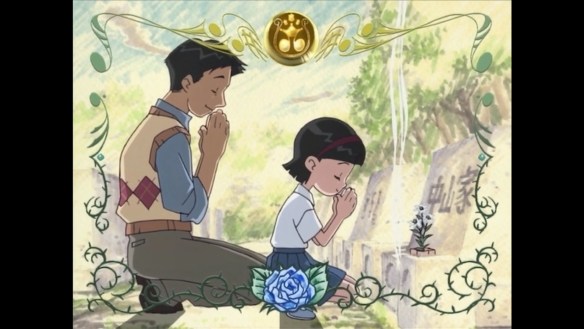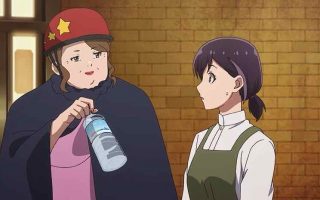Hello folks, and welcome back to Wrong Every Time. Today I thought we’d check in with Doremi and the gang for another ojamajo adventure, as our girls do their dubious best to prove themselves worthy witches. Our last outing was a fantastic slice of insanity, as Doremi’s exceptional and much-adored sister Pop took center stage, balancing the affections of her classmate and arrival of a handsome new teacher with characteristic grace. We even concluded on a reprise of Faithful Dog Doremi and her canine companions, always a clear sign of an upper echelon Doremi episode.
With our last two episodes having featured first cow and then sheep stampedes, I imagine we’re in for a quieter adventure this time, perhaps one that falls more on the emotional end of Doremi’s broad dramatic palette. We’ve certainly got the staff for it; after all, this coming episode is directed by Junichi Sato, the legendary director of Sailor Moon, Princess Tutu, and Aria the Animation. With our journey in such eminently trustworthy hands, let’s see what awaits Doremi and the girls!
Episode 15
Yeah, that didn’t take long. Our cold open sees a father and daughter placing flowers at the Nakayama family grave, presumably visiting the family’s absent mother. Absurd credit to Ojamajo Doremi that it can so skillfully balance thoughtful, delicately illustrated human drama with carefree absurdity like Faithful Dog Doremi. Even Sato’s own Sailor Moon struggles with that – Sailor Moon’s farcical hits are unimpeachable, but it can’t reach Doremi’s sensitivity of human drama
Direction is active from the start as we cut into Doremi’s class commencing an art lesson, with jauntily angled establishing shots first introducing us to the paints and brushes. Sato is one of the greatest directors in anime history, and one of his particular strengths is his ability to sculpt tone across time and imagery, to draw viewers into the particular pace of his adventures. Some directors have a particular tone or visual palette they tend to stick to, but you can see in the contrast between something like Sailor Moon and Aria how well Sato can draw the audience into the pace of life in a particular drama, employing a mixture of long environmental or pillow shots to slow things down, and aggressively cut conversational drama to speed things up
Here, both the energetic opening shots and Doremi’s boasting about her future steak drawing create an immediate light, energetic tone that serves as the background noise of our actual drama. Our attention is called across the room, ostensibly by the cry of one of the boys joking at Doremi’s expense, but the camera holds on the silent girl we saw from the opening. An excellent way to contrast the room’s general tone with this girl’s diminutive presence within it
This opening is also a natural celebration of how well we’ve come to know this class, as a variety of characters who’ve all had their own focus episodes chime in or simply chuckle in the background
Tamaki suggests they all draw their mothers for Mother’s Day, which of course prompts a shocked look down from our focus character. An immediate quiet lesson in respecting the circumstances of others, demonstrating how easily pain can result even from honest intentions. We can’t really exist without hurting each other somehow, which is why it is so essential be considerate, inquisitive, and forgiving
“Mother’s Day and the Drawing of Mother”
We see that consideration being expressed immediately in the context of Aiko, whose parents are separated and mother living far from home. Her friends all look to gauge her reaction before offering their own, making sure she’s comfortable with this arrangement
Two other students seem to notice our focus character’s unease: the ever-watchful Masaru and considerate Hadzuki. However, the drawing plan is affirmed by Seki-sensei before Hadzuki can speak up
Masaru continues to keep an eye on her as the class proceeds. Ojamajo Doremi’s long-running format and ensemble approach naturally facilitate its exploration of the diversity of personal perspective; Masaru was established as a thoughtful, introspective character dozens of episodes ago, and the show’s continuing adventures offer plentiful opportunities to demonstrate the various ways that or other personal qualities impact our ability to understand and connect with each other. Even Tamaki’s personality can be celebrated on a long enough time frame; short narratives need heroes and antagonists, but longer, circling narratives can let people just be people
Hadzuki says Doremi’s painting is an insult to her mother. Incredibly harsh, Hadzuki
Meanwhile, Masaru realizes his classmate has started to cry, and swiftly draws the teacher’s attention to keep everyone else from noticing. What a good kid
He basically rejects the class entirely, drawing a goofy smiley face and then storming out of the class. Our methods of helping each other are always imperfect; Masaru doesn’t have the power to make the class reject this assignment, but he can reject it himself, and at least draw the fire from this lonely girl
Hadzuki can at least partially understand Masaru’s reasoning, while Aiko and Doremi exchange confused looks. Another strength of this show’s ensemble approach: demonstrating how even kind, considerate people like our leads can often miss things, simply because our experiences are so diverse and personal
Outside the classroom, Masaru is able to explain to Seki-sensei about Nakayama’s mother without making it a public scene. It seems her first name is Shiori
Seki-sensei knows the truth, but also understands that walking on eggshells around Nakayama won’t necessarily help her. Masaru runs off in frustration
The baby faeries have some serious critiques regarding the girls’ portraits
Doremi notes that Masaru’s own mother died when he was very young, and that his father remarried. It is thus Masaru’s direct experience of Nakayama’s grief that allows him to understand and sympathize with her so fully
Majo Rika is swift to reintroduce us to the horrors of witch capitalism, announcing she ordered three hundred carnations for them to sell on Mother’s Day
You can really see the family resemblance as Nakayama’s father drops her off at school. But she’s unable to face all the reminders of her loss that would await her, and thus flees when he’s out of sight
Skipping class, she finds Masaru waiting for her at the playground
Masaru opens with a statement of solidarity, declaring how much he dislikes Mother’s Day. He’s such a sensitive kid – he even understands that Nakayama feels ashamed of not enjoying something all the other kids take for granted, and thus must be encouraged to speak her own feelings through his preemptive statement of agreement
Driving past in her mother’s car, Onpu notices the pair of them
Distracted by the double absenteeism, Seki-sensei has to be called to attention by the students. A moment reflecting another of Ojamajo Doremi’s key strengths – its understanding that adults are neither always wrong nor infallible, they are simply people with more life experience who are trying to do their best for those who follow them. Seki-sensei believed Nakayama needed to face her fear, and underestimated the depth of her student’s feelings; now, she’s no longer certain how she can actually help
The jokester trio claim the two are on a date, which Hadzuki angrily denies. The distinct personalities of their various schoolmates, contrasted across a variety of incidental dramas, also demonstrate how we naturally create friction simply by being our diverse selves
Seki-sensei heads out after them after Onpu reveals their location, and the girls elect to follow in witch form. You know it’s a special episode when they have to abridge the transformation bank footage!
“I don’t really like the term, but my mother is really my stepmother.” Understandably, Masaru simply wants others not to make a big deal out of his circumstances. Nothing worse than unwanted pity
“I know they’re all just being nice, but it just makes me feel sadder.” His honesty helps Nakayama open up as well
Seki-sensei at last apologizes, and reveals that she actually used to skip school on Father’s Day
Ooh, I love these shots of Seki’s childhood with her father. All partial body shots or images from behind them, so you can’t see their faces, alongside a heavy filter of later-afternoon light blurring the whole scene. A terrific way of conveying treasured yet distant memories, the small fragments of her father that she still holds close
“Being in a single-parent family made me go through some tough times.” Lovely shading through this sequence, alongside open, slow-panning compositions that force the audience to linger on the emotions at play, the silences between their words and gaps between their perspectives. As I said, Sato is basically unparalleled when it comes to controlling dramatic tempo and letting a scene breathe
Jeez! She reveals she was actually rejected for a position at a private elementary school because the administrators thought her single-parent background would make kids uncomfortable
Seki-sensei at last doing what Masaru did intuitively: preemptively revealing her context and sympathy for Shiori’s position, so they find it easier to voice their own feelings
“Mother’s Day comes every year. If you feel sad about it every year, won’t your mother in heaven feel the same way, too?” A lesson that comes more frequently as we age – learning to celebrate the times we had with those we love, not preoccupy ourselves with their absence
Both Masaru and Nakayama cry, but they’re good tears – tears of thanks, of remembrance for how much they love their mothers. We can’t keep our grief bottled inside, or we will never be able to move beyond it, and celebrate the people we’ve loved with tears in our eyes
Nakayama explains that she cried in class because her memories of her mother were indistinct – she couldn’t remember her well enough to draw her. Another good reason not to cradle our grief, but to celebrate the people we loved
“When I think about the possibility that one day I will forget her completely, I get sadder and sadder.” Gosh, this show can really tear your heart out. I knew we were due for a tearjerker, but still!
Embarrassed to admit he loves his mom, Masaru flees back to class. Incredibly sensitive when it comes to other’s feelings, but unable to acknowledge his own – he’s a very compelling character
Inspired by their sincerity, Aiko decides to write a letter to her mom
The next day, Hadzuki helps Masaru find some petunias that feel right for both his birth and current mother. No surprise those two are growing close, they’re likely the most emotionally perceptive members of their class
Nakayama shows up near the end of the day, and the girls bewitch a perfect flower for her. Among its endless strengths, this might be the biggest reason I love this show – it understands that helping a girl properly mourn her absent mother is as important as any great work of drama could be, and it endeavors to make sure we in the audience feel just as invested in these precious feelings
They infuse the flowers with a memory of her mother’s face, so she can remember her more clearly
And Done
Yep, here come the tears. Ahhh, I’m a mess again. This show! It’s easy to strive for an emotional reaction by engaging in big swerves of dramatic fortunes, but Ojamajo Doremi does something so different and so much more valuable – it illustrates the vast emotional landscapes embedded in the smallest of gestures, how every day we brush against the profound personal seas roiling in everyone we meet, and how acknowledging that commonality is nothing less than the great work of being human. There is nothing more essential to the human experience than reaching out with empathy and curiosity, seeking to recognize our common ground and celebrate our differences. Ojamajo Doremi’s characters do that with their every wandering adventure, and the production itself serves as an icon of that pursuit, instructing entire generations to act with kindness and learn to love each other. This is how art transforms us, makes us more thoughtful and considerate and broad-minded and curious. What a wonderful show.
This article was made possible by reader support. Thank you all for all that you do.



